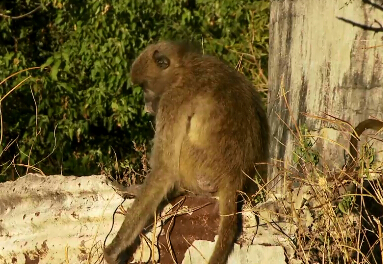Scientists are helping South Africa track a band of persistent criminals: baboons.
科学家正在帮助南非追踪一群持久的罪犯:狒狒。
South Africa's baboon population is feeling the pressure of a shrinking habitat. With fewer traditional food sources available, the animals have resorted to stealing food from nearby humans. They raid homes, gardens and trash. Some even approach cars and steal food right out of people's hands.
南非狒狒种群正面临栖息地萎缩的压力。由于传统食物来源越来越少,狒狒们不得不从附近的居民那里偷食物。他们突袭房屋,花园和垃圾。有些狒狒甚至接近汽车,从人们手中偷取食物。
A team of researchers has developed a tracking collar. It allows them to monitor the baboons' behavior and track their movements more closely than ever to try to help the government address the growing problem.
一组研究人员开发了一种跟踪项圈。它能够监控狒狒的行为,并比以往更加紧密的跟踪他们的行径,以此帮助政府解决日益严重的问题。

The baboon raids got so bad, people began shooting and killing baboons that entered their property. But the government soon got involved amid pressure from conservationists who were concerned about population decline.
狒狒的袭击变得如此糟糕,人们开始射击和杀死进入他们领地的狒狒。但政府很快就卷入来自环保主义者的压力,他们关心狒狒数量下降。
It established a baboon management system to better control raiding baboons. Last year, officials erected a virtual fence around residential areas,the fence emits the noise of a predator to scare off approaching baboons.
它建立了狒狒管理系统,以更好地控制袭击狒狒。去年,官员们在居民区竖起了一道虚拟栅栏,栅栏发出捕食者的声音来吓唬接近的狒狒。
But some baboons are still getting around the system. The scientists hope their new tracking collars will tell them exactly how.
但一些狒狒仍然在系统周围走动。科学家们希望他们的新跟踪项圈能准确地告诉他们如何赶走狒狒。
译文属可可原创,仅供学习交流使用,未经许可请勿转载。












